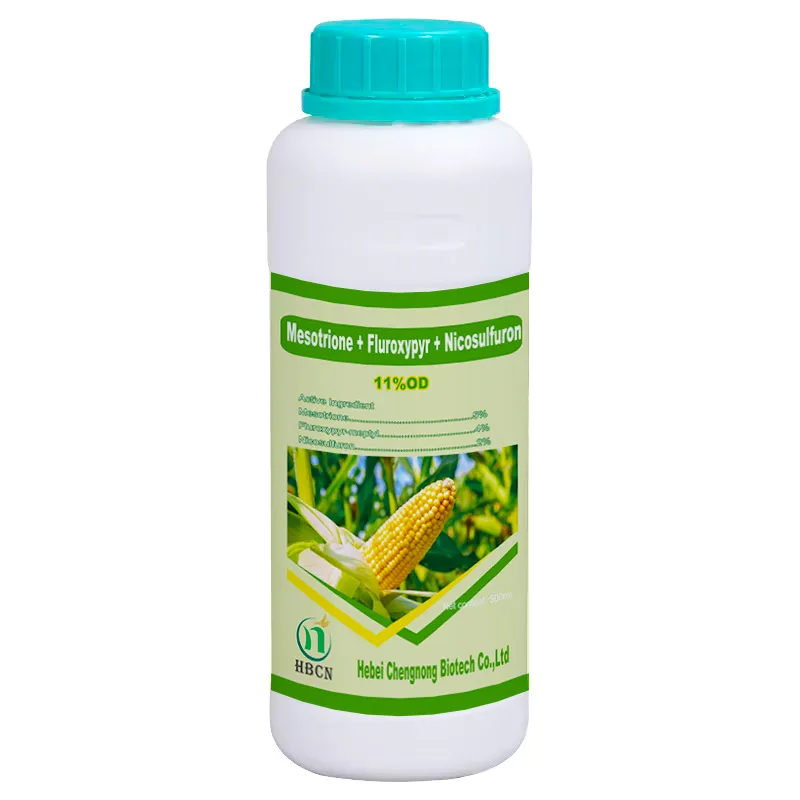
jan . 06, 2025 19:04 Back to list
best mesotrione technical msds
Mesotrione stands as a remarkable innovation in the realm of agricultural herbicides, championed for its ability to selectively target broadleaf weeds and grasses while preserving the integrity of the desired crops. This powerful herbicide, originally derived from the natural phytotoxin Leptospermone found in the bottlebrush plant, has been engineered to offer precision weed control, contributing significantly to sustainable agriculture.

The active ingredient in Mesotrione functions by inhibiting the enzyme 4-hydroxyphenylpyruvate dioxygenase (HPPD), crucial for carotenoid biosynthesis in plants. This mode of action results in the bleaching of treated plants, as carotenoids protect chlorophyll from photodegradation. Consequently, treated weeds exhibit a distinctive white appearance before succumbing, leading to their eventual demise. Farmers and agricultural experts alike praise Mesotrione for this targeted activity, which significantly reduces competition from weeds without compromising crop yield.
From a practical standpoint, Mesotrione's versatility extends across various crops, including corn, soybeans, and cereals, offering a broad spectrum of weed control. It is particularly effective against tough-to-manage species such as pigweed, lambsquarters, and velvetleaf, making it a preferred choice among farmers dealing with resistant weed populations. Furthermore, its use is not restricted to certain growth stages, allowing for flexible application timing that can be adapted to the needs of different cropping systems.

The application of Mesotrione contributes to integrated weed management (IWM) practices. As part of a comprehensive weed control strategy, it supports crop rotation and the use of multiple modes of action to delay the onset of herbicide resistance. This strategic approach ensures the long-term viability of herbicides, enhancing their utility and efficacy in agricultural contexts.
mesotrione
Safety and environmental impact are paramount considerations for contemporary herbicides. Mesotrione exhibits a favorable environmental profile, characterized by low soil residue persistence and minimal leaching potential. Its safety margin is bolstered by its low mammalian toxicity, making it a conscientious choice for farmworkers and adjacent ecosystems.
Regulatory bodies, including the U.S. Environmental Protection Agency (EPA), endorse Mesotrione after rigorous evaluation of its safety and efficacy. Such endorsements reinforce trust in its use, ensuring that it meets the stringent requirements governing agricultural chemicals.
Experts in weed science continue to explore the full potential of Mesotrione in combination with other herbicides to enhance its effectiveness and delay resistance development. Through ongoing research and field trials, the agricultural community remains committed to optimizing its usage, maximizing benefits, and minimizing risks.
In conclusion, Mesotrione exemplifies a key advancement in weed management, drawing on extensive expertise, credible research, and practical experience to meet the challenges faced by modern agriculture. Its integration into crop management systems underlines its role as a vital tool for promoting efficient food production while safeguarding environmental health.
-
Indoxacarb PubChem Key Pesticide Properties & Benefits
NewsJun.09,2025
-
Premium EPA Chlorpyrifos High-Efficiency Pest Control
NewsJun.09,2025
-
Whip Super Herbicide Fast-Acting Selective Weed Killer Control
NewsJun.09,2025
-
Professional-Grade Bifenthrin Mosquito Fogger Long-Lasting Outdoor Protection
NewsJun.08,2025
-
Sivanto Insecticide Advanced Pest Solution for Fruit Trees
NewsJun.08,2025
-
Hornet Fungicide Superior Carbendazim Formula for Citrus & Crops
NewsJun.08,2025
